For Gabby Thomas, Olympic Medals are a Means to an End
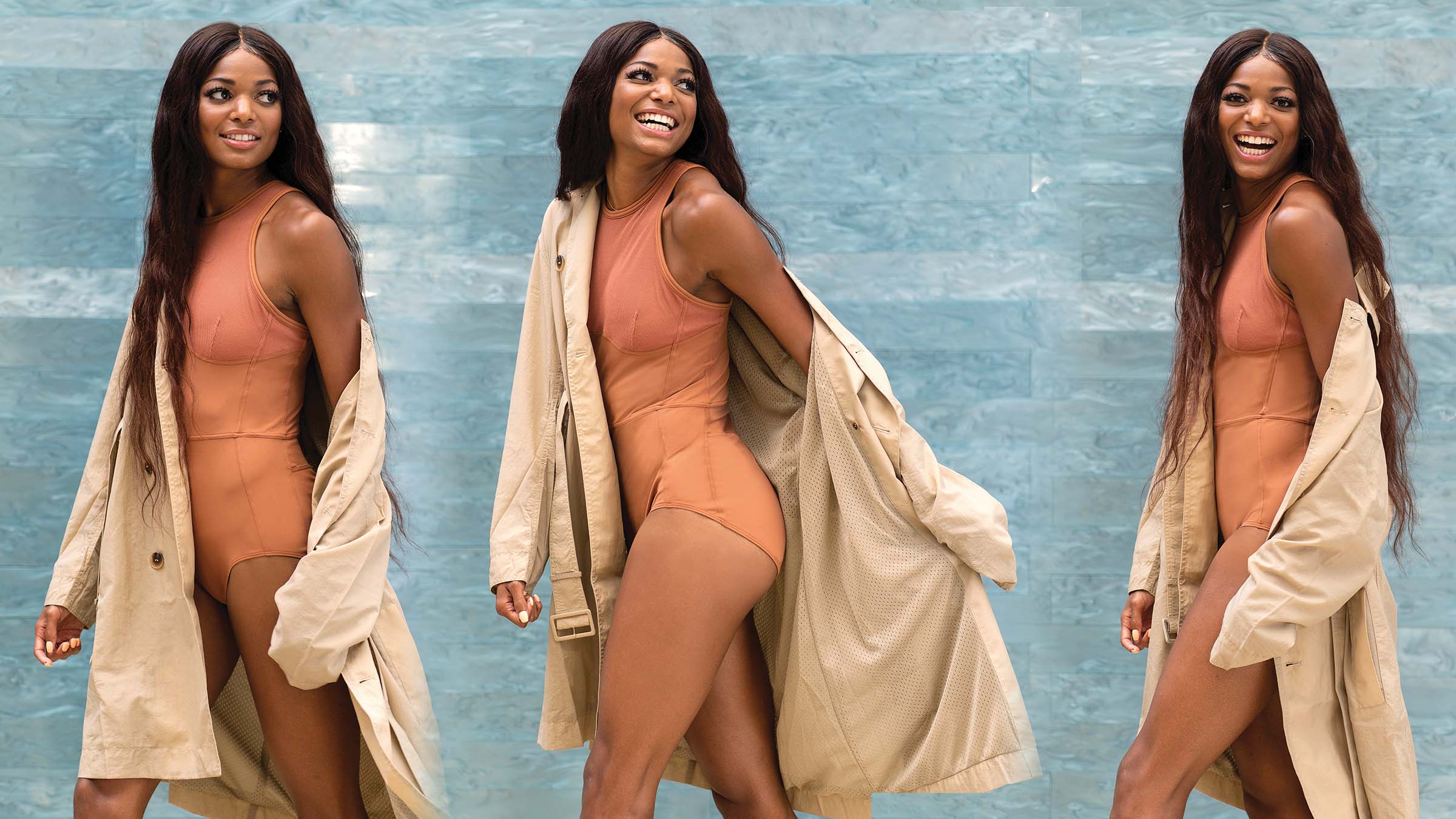
(Photo: Weston Carls)
You’ll probably never find Jennifer Randall at Hayward Field. Or at an Olympic stadium. Or sitting track-side anywhere her daughter, sprinter Gabby Thomas, is competing for something of consequence.
“I always watch Gabby in big competitions alone and in silence,” Randall says. “My preference is that no one else be anywhere near me. And if you must be there, you must not engage in conversation. My preference is that you just hold your breath.”
Thankfully most of Thomas’s races are over in 22 seconds or less. But between the U.S. Olympic Track & Field Trials and the Tokyo Games (where spectators were barred because of the pandemic), Randall has understandably spent a lot of time alone this year. When her daughter placed third in the 200 meters on August 3 at her first Olympics, Randall watched the livestream at 8:50 a.m. from home in Amherst, Massachusetts, even as parties were thrown by friends, neighbors, and family members nearby.
It was clear to the naked eye that Jamaica’s Elaine Thompson-Herah had won and Namibia’s Christine Mboma had stormed into second…but third place? It could’ve been Thomas. Or it could’ve been Shelly-Ann Fraser-Price.
Whatever the case, it was probably good that nobody else was around to witness the finish from Randall’s couch. “I swear to God, they immediately switched to the pole vault. The pole vault. What the hell?! I’m screaming at the screen because I have no idea if she medaled,” Randall says. “No one needed to be in the room to hear the onslaught of expletives that were coming out of my mouth.”
The camera quickly flashed back to Thomas’s face, no longer looking up at the jumbotron nervously anticipating the official results to post. By then she was wearing a big smile and an American flag around her shoulders. And Randall knew. Her daughter was the 2021 Olympic bronze medalist in the 200 meters, finishing in 21.87 to Thompson-Herah’s time of 21.53 and Mboma’s 21.81.
“That smile. It was just so full of joy. Like, unadulterated joy,” Randall says. “It was fantastic. That was the thing, right? That was the thing I like to see.”
It wasn’t just Thomas’s first Olympics—with the exception of world relays, it was the first U.S. team she’s ever made, competing for the first time against the world’s fastest women (she also earned silver as part of the 4 x 100-meter relay). At 24 years old, new to an international stage, she arrived in Tokyo in July after winning the U.S. Olympic Trials with a heavy title to carry: “gold-medal contender.” In that race in Eugene, Oregon, she became the second-fastest woman ever at the distance in 21.61, behind only world-record holder Florence Griffith-Joyner (21.34).
“When they pulled the curtains and walked us out to the track at the Olympic stadium, I thought I was going to faint,” Thomas says.
RELATED: Gabby Thomas Makes Olympic Team, Becoming Second-Fastest Woman Ever at 200 Meters
Getting Schooled
In the grand scheme of things, it all escalated rather quickly. Thomas wasn’t born with a dream of becoming a track star.
“I was never forced to do anything that I did not want to do,” Thomas says. “Except for track in seventh grade. I didn’t want to do track.” But it was one thing that Randall, a single mother to Thomas, and her twin brother, Drew, was unwilling to negotiate.
“She wanted to be on the softball team and I, quite frankly, do not enjoy softball. I also do not enjoy baseball, so it is not sexist,” Randall says. “I just was not about to spend my spring watching softball. I said, ‘This is an insane argument. You are super fast. You are going to run track. Why am I having this discussion with a 12-year-old?’”
Shortly after that inaugural season, Thomas tuned in to watch the 2012 Olympic Trials on television. Allyson Felix, now the most-decorated track and field athlete in history, won the 200 meters to qualify for Team USA for a third time. Thomas was starstruck—and has been in awe of Felix ever since. Competing against her at the same meet in 2021 was surreal—Felix placed fifth in the 200 meters, but made her fifth and final Games in the 400 meters and took bronze in Tokyo, as well as gold in the 4 x 400-meter relay.
“[Felix’s] humility and grace and how good she is at what she does…to be on the team with her, it makes me want to cry,” Thomas said after winning the 200-meters final at the Trials.
The story’s been widely told at this point, but Thomas’s route to the pinnacle of the sport has been untraditional. Her parents, who divorced when she was 4, met at Duke University and moved to Atlanta, where the twins were born. Randall earned her Ph.D. from Emory University and taught preschool and high school social studies before moving with the kids to Florence, Massachusetts, where she became associate professor at the University of Massachusetts.
Education has always been the way for Randall, and subsequently for her children. She currently researches ways in which educational assessments perpetuate racism and how traditional evaluations can put students of color at a disadvantage. Back when she was in graduate school, Randall often had no childcare, so she’d take the kids to class.
“I remember Gabby sitting next to me in calculus class, taking notes. She wrote down everything that the professor wrote on the board,” Randall says. “It’s just so much a part of who they are.”
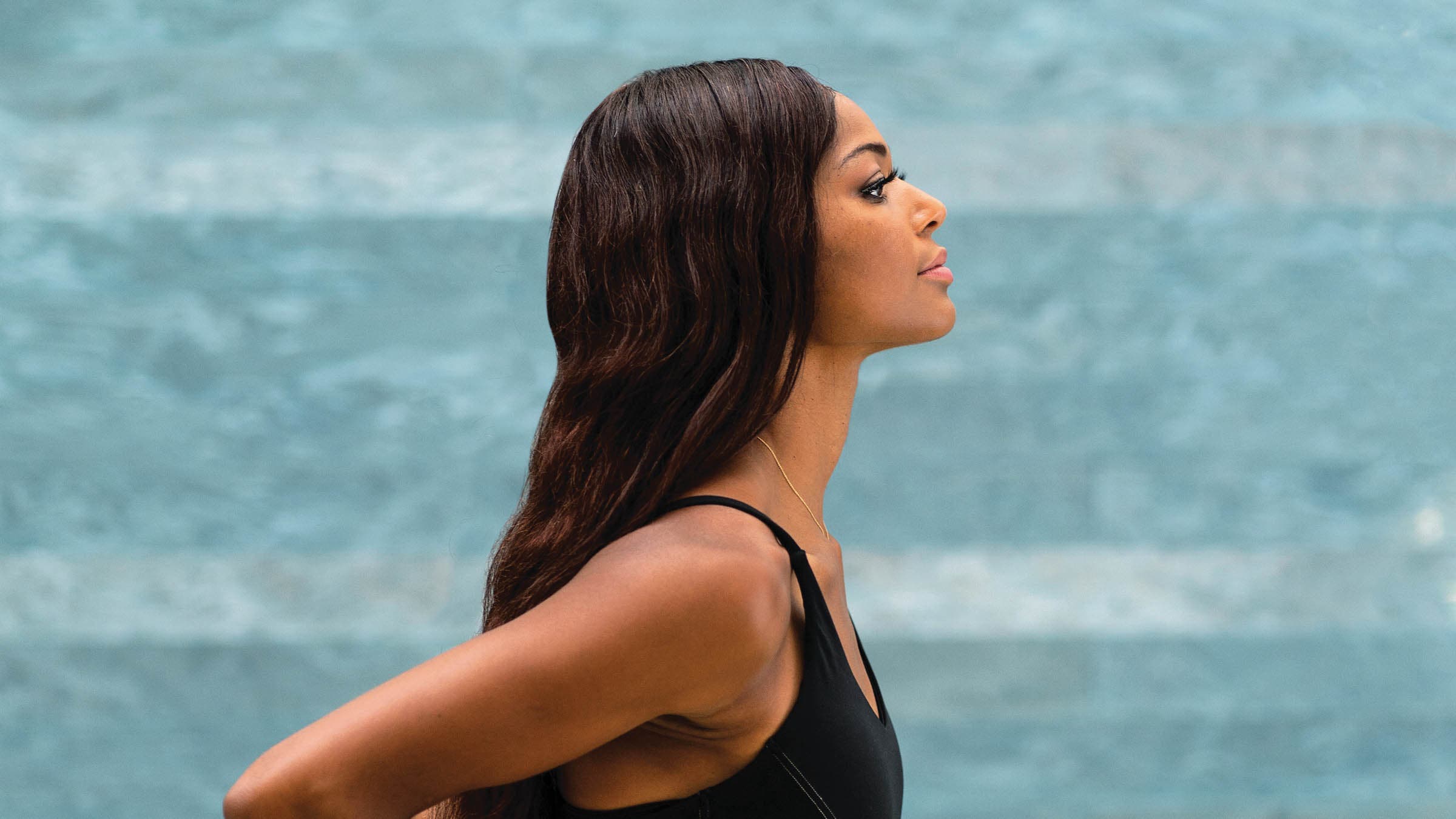
As early as Thomas’s toddler years, Randall realized the most critical aspect of raising a daughter who was already showing signs of talent and intelligence. “I don’t even know if she had been potty trained yet, but it was so obvious from the beginning that she was gorgeous and brilliant and this girl was running on air, so coordinated,” Randall says. “And quite frankly, at the time, I thought to myself with all of this, she could also turn out to be a truly horrible person. So I thought, I have to be sure that this child is kind. I didn’t worry about the rest. My goal was to make sure that she would be kind.”
When they moved to Massachusetts, Thomas enrolled at Williston Northampton School, a private academy with rigorous academics, where she played soccer and reluctantly joined the track team, too. Although she was fast, Thomas didn’t take running seriously until colleges started noticing her during her junior year. And as everybody knows by now, Thomas ended up going to Harvard.
But the next four years were no fairytale. Inspired by her younger brother Desi, who has autism, and her twin, who went to neuro-feedback therapy for ADHD in high school, she chose to major in neurobiology and global health policy, while also working at the Harvard laundry service and competing for the university’s Division I track and field team. Learning to tend to all the competing responsibilities, establishing a social life, and excelling at it all was overwhelming.
“Classes were really hard and really, I think I was on the brink of failing my biology class my sophomore year. I remember going to my professor’s office and begging him to give me an opportunity to get a passing grade,” Thomas says. “I was stressed in the classroom, which made track worse. It became too much.”
Learning to Recover
Although she strongly considered quitting track, Thomas took a break instead. On a whim she applied for an eight-week study abroad program in Senegal. Her mom scraped together money to cover airfare and Thomas told her coach she’d be gone for a while.
She settled in Dakar and immersed herself in the culture, where the people valued community, connection, and generosity. She rarely looked at social media and eventually didn’t even think about grades or running.
“I was just very much in the present and in the moment and learning so much,” Thomas says. “Other than now, going to the Olympics, it was the best summer of my life. I just came back feeling refreshed. I just felt different. My priorities were different.”
She went on to become the 2018 NCAA indoor 200-meter champion in a record time of 22.38, the first Ivy League sprinter to win a national title. Her success and newfound ability to juggle the rigors of the classroom and the track led to another opportunity: a pro contract with New Balance. She gave up her remaining collegiate eligibility to take the deal, but remained at Harvard to finish her degree, finding a new purpose through her studies in eliminating racial disparities in the U.S. healthcare system.
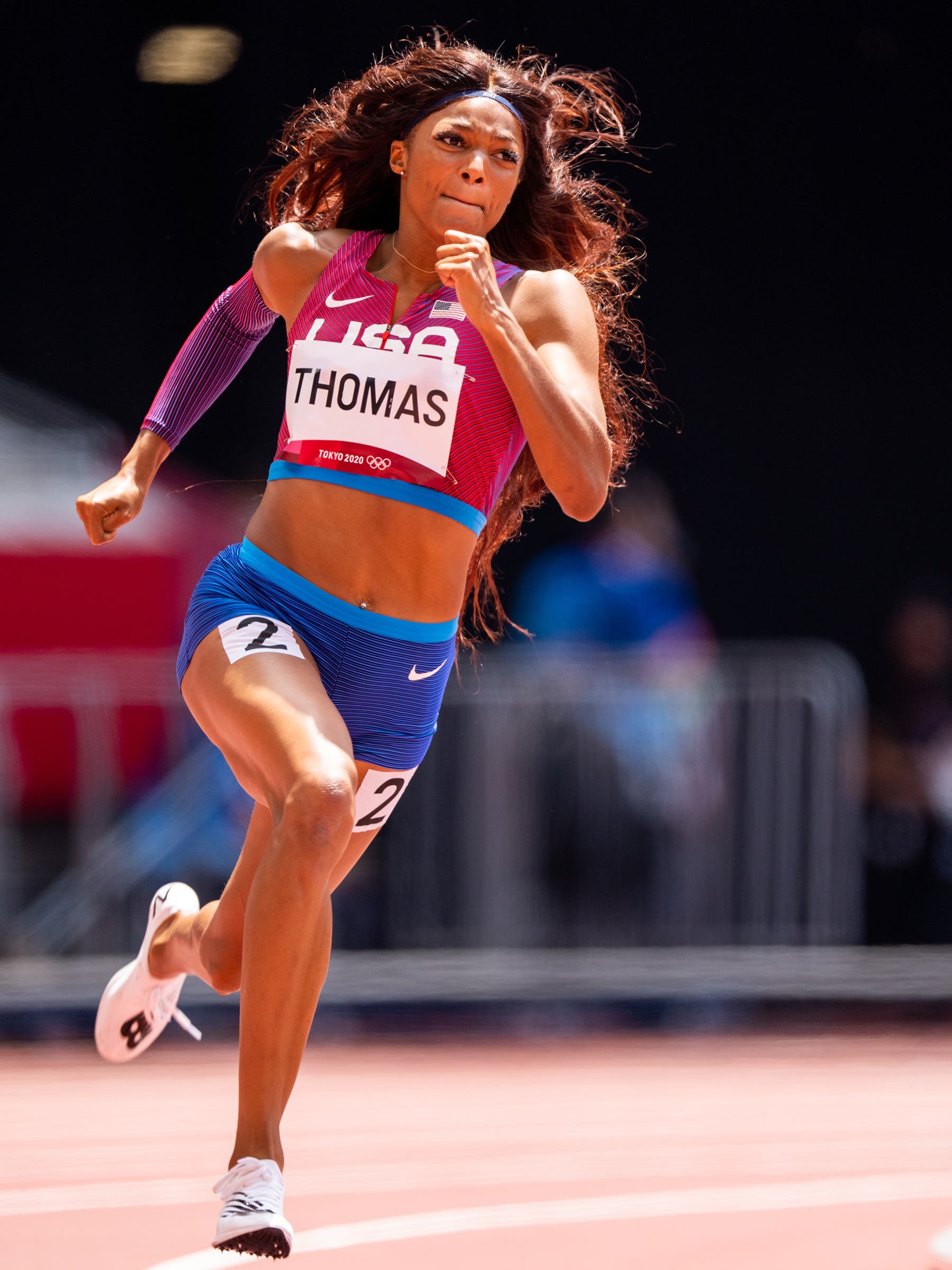
The important lesson—one she carries with her today—was that rest and recovery are critical, no matter her goals.
“Honestly, I think there’s a parallel between that summer in Senegal and COVID in 2020,” Thomas says. “We had a long period of time where we just weren’t doing anything and we had a break. I came back just really ready to go and it showed. Getting away from any type of pressure is important for me—there are so many expectations all the time.”
After graduation in 2019, Thomas knew she needed to find a new environment where she could learn how to become a professional runner. She searched out a place where she could also pursue a master’s degree in epidemiology while training. She moved to Austin, Texas, where she’s a graduate student at the University of Texas and a member of the “Bailey Bunch,” under coach Tonja Buford-Bailey, three-time Olympian and 1996 bronze medalist in the 400-meter hurdles.
The location and the training group have proven the perfect combination for Thomas—in some unexpected ways.
“To have a Black female coach and a bunch of Black female athletes was icing on the cake,” Thomas says. “Moving into this space, when I’m so used to being in predominantly white spaces, I felt comfortable and excited about that. It’s so empowering…being a winner is kind of the standard and that’s what I needed. It was a huge, necessary step for me.”
Under Pressure
Thomas has gone through all the typical adjustments that all new pro athletes face. She quickly realized that she had to pay attention to the details if she wanted to compete on the world stage. She had never given much consideration to her diet and nutrition, for example, often eating dinner as late as 11 p.m.
She learned that sleep was essential. And she figured out pretty quickly that the weight room was an integral part of her training, which she had only half-heartedly done before. She had to schedule classes around her practices, and given her success on the track, she’s also recalculated the trajectory of her academic career, deciding, for instance, that it’d be better to take the Olympic summer off from schoolwork.
All that said, she also found that coping with pressure is a big part of the game, which was never more apparent than in Tokyo. After the first round of the 200 meters, she laughed along with the Wonder Woman memes circulating after a photo of her at the finish resembled the superhero—hands on hips, flowing hair on point, looking strong and capable. But it took a turn after her semifinal round when she didn’t have a great performance, though she did well enough to qualify for the final.
“I think I was just exhausted—maybe it was jet lag but I struggled more than the other athletes did,” Thomas says. “And afterward I read a lot of negativity on the internet. Everyone was saying that I looked so horrible and that the U.S. wasn’t going to get a medal.”
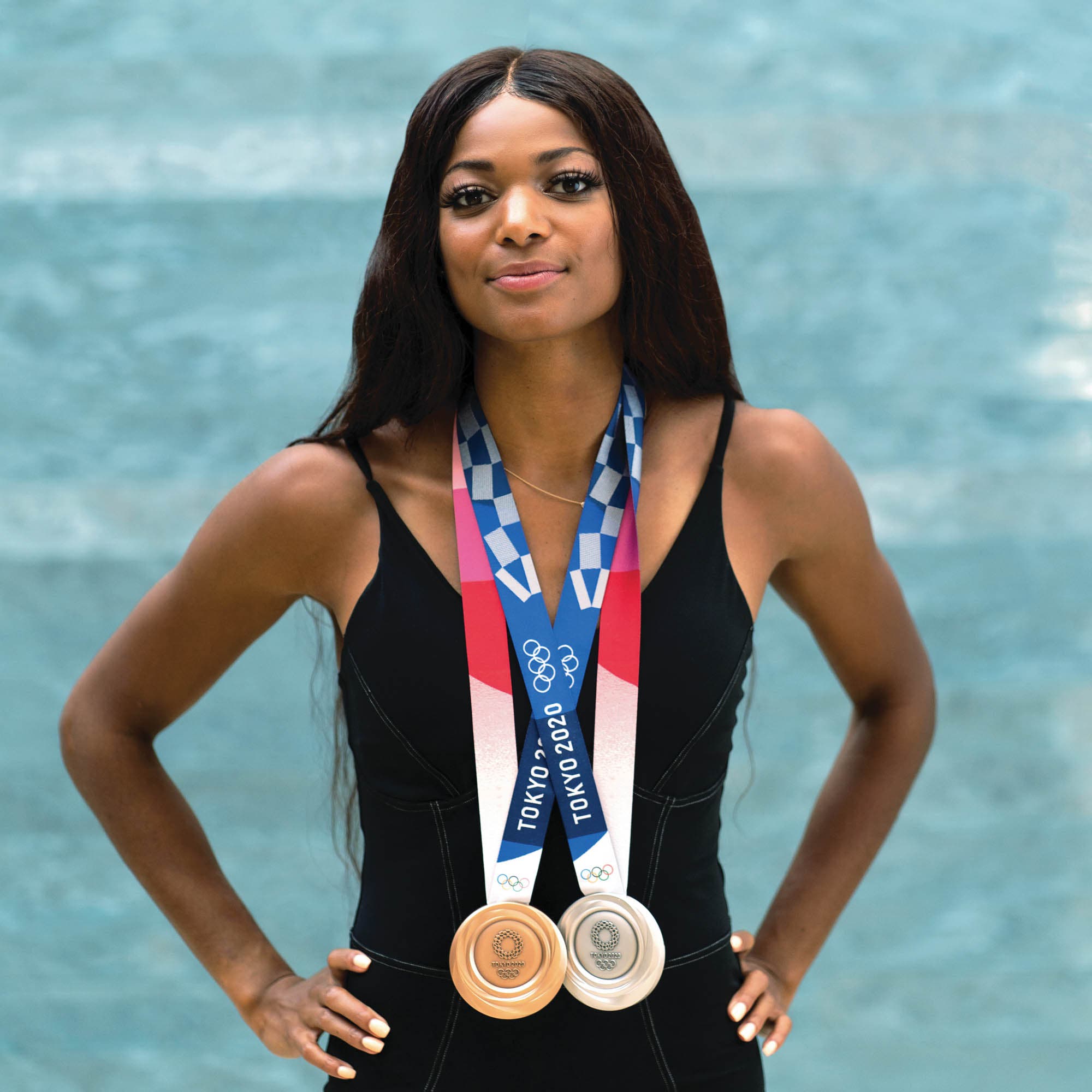
Maybe reading social media comments wasn’t the best idea, but the athletes were also facing a unique situation in 2021, isolated from their typical support systems and relegated mostly to the Olympic Village between events. It was a means of seeking encouragement and connection for many.
“I wanted to be on the socials because it’s fun to share the Olympic experience and see a lot of support,” Thomas says. “But there were a lot of comments that were making me nervous. It was definitely in the back of my mind the entire time, just what people are going to say about me. When I was tagged in so many negative comments, that’s when I realized, ‘Wow, so many people are watching and so many people actually care.’”
It helped that everybody in the village was dealing with the same challenges. Her suitemates—Quanera Hayes, Wadeline Jonathas, Ajee’ Wilson, Javianne Oliver, and Rachel McCoy—became a huge source of comfort. But she had developed a few other tools over the years to cope. Meditation has been helpful, guiding Thomas back to focusing on why she’s competing in the first place: because it’s fun.
“I’ve been worried a lot about what’s being perceived about me now is just that I can do everything and even the Wonder Woman meme is like, ‘Oh, she’s just this perfect human being who went to Harvard and now is an Olympic medalist—what can’t she do?’” Thomas says. “There’s a lot of things I can’t do. And I’ve had so many breakdowns where I was seeking therapy often because it was just a lot to manage. I get very overwhelmed very easily—I’m very prone to anxiety. When I do so much at one time, little things will really offset me, when I don’t have things completely under control.”
She’s also leaned heavily on her core group of friends, who tend to take her out of her element any chance they can. Ngozi Musa, one of her closest college teammates, went to cheer Thomas on at the Trials and tries to bring out the spontaneity in her friend.
“She’s the practical, calm one and I’m kind of the storm coming through, all over the place,” Musa says. “I push her to get out and explore, plan adventures. But I feel like she handles it all with such grace. With all the pressures that she’s under, she still makes space for other people and listens. She’s just a really understanding, even-keeled person you can go to for advice on random things about life.”
Correcting an Injustice
After the long Olympic season was over, Thomas was feeling energized, but in need of another break, too. In 2021 she learned a lot about herself and what she’s capable of achieving. But she also was constantly reminded of what she wants to do with an ever-growing platform afforded to her by running fast.
“There are a lot of people and a lot of organizations who have reached out and want to partner with me, and I think that’s one of the greatest parts of all this,” Thomas says. “I imagine that there are a lot of people who follow me who just haven’t really had the opportunity to think about how healthcare affects different demographics and how they might be exposed to different diseases and illnesses. People are ready to have the conversations and that warms my heart.”
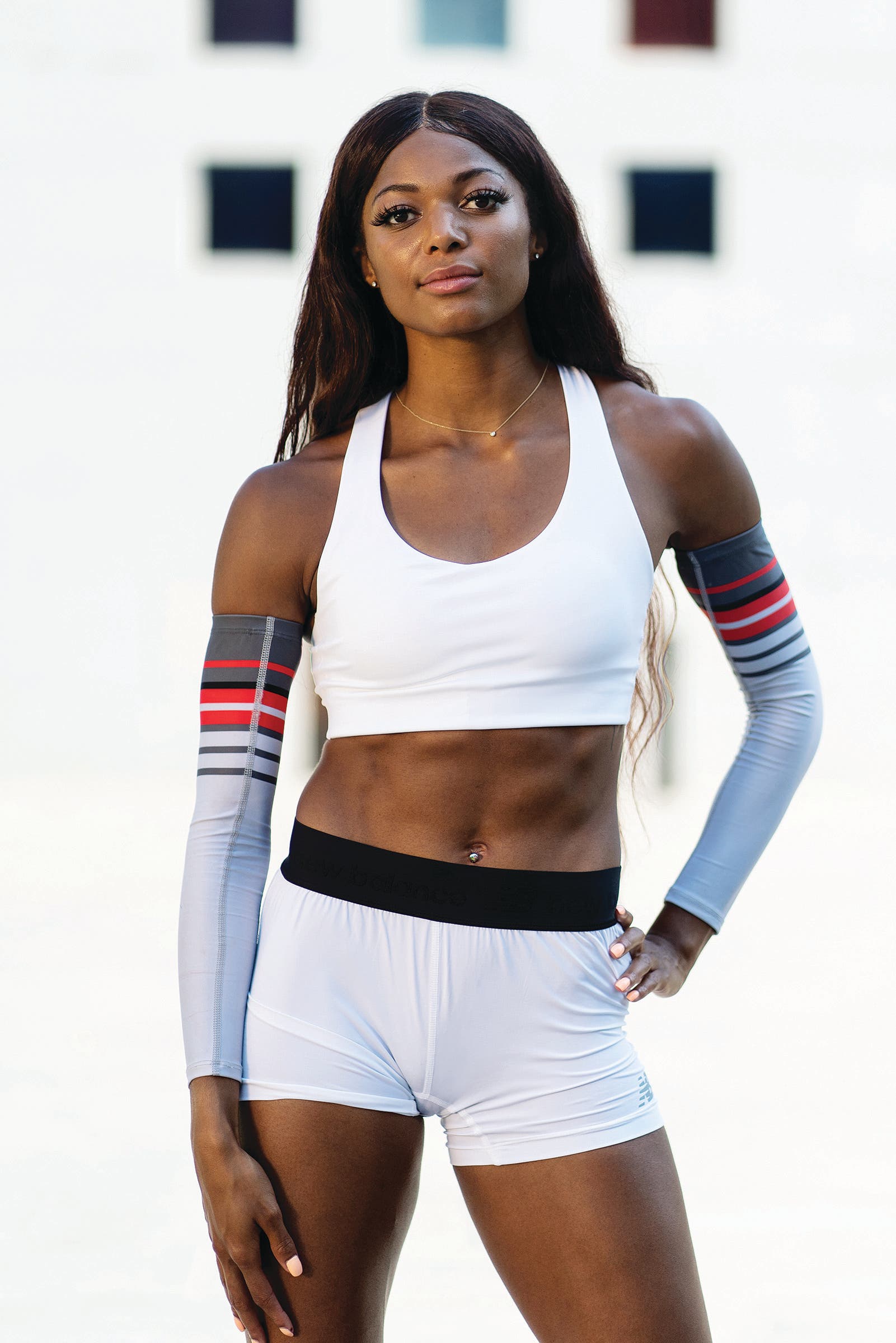
A track career, of course, does not last forever. For Thomas, that’s the point. After she finishes graduate school (her goal is to ultimately earn a Ph.D.), she one day wants to run her own nonprofit healthcare organization or hospital.
“I have this opportunity now and I owe it to so many communities to do something with what I’ve been given,” she says. “I have a social responsibility at this point to leverage this platform the best that I can and do it in a way that will make the greatest impact.”
Thomas’s mom grew up in a family that, despite working hard, went without health insurance—Randall never saw a dentist until she could pay for it as an adult. She remains a constant example and influence on her daughter.
“We all have to pick an issue, an injustice that we want to correct. She’s looked around her community and she has seen the impact of disparate healthcare services,” Randall says. “Going to Harvard is a means to an end. Being a professional athlete is a means to an end. Going to the Olympics? It provides you a means to an end—to pay it forward; to fight for justice.”
Thomas has found liberation, also, in her success. Moving ahead to the 2022 world championships and the 2024 Games, she’s learned a lot about how to compete under all kinds of circumstances and that she belongs on the starting lines with the best in the world. She has a better sense of what matters, which frees her from a certain amount of expectations.
“I know now, deep down, that this is just something that I love and the sun’s going to come up the next day and I’m still going to be loved and supported by everyone who matters,” she says. “I found that level of peace. I’m here doing what I love, having fun.”
Her mom, of course, will remain her biggest fan and hype woman. “Nobody ever talks about Gabby’s citation in French at Harvard,” Randall says, laughing.
Give it three years, professor. The summer of 2024 awaits. On se voit à Paris.
Fast Facts about Gabby Thomas
Parents: Jennifer Randall lives in Amherst, Massachusetts; Desmond Thomas is in Chicago.
Siblings: Twin brother, Drew; 18-year-old brother, Desi; 9-year-old brother, Tyler; and 5-year-old sister, Kim.
Home Base: Lives in Austin, Texas, but considers Massachusetts and Chicago “home” when she visits family.
Emotional Support Pug: When she moved to Austin, Thomas didn’t know many people. She adopted Rico and considers the rescue pug her “savior.”
“A lot of times, I’m doing track and doing school and when either of those aren’t going super well, it’s easy to feel like I’m a failure. Instead of sitting in that, I got a friend. Adopting Rico is the best thing I ever did.”
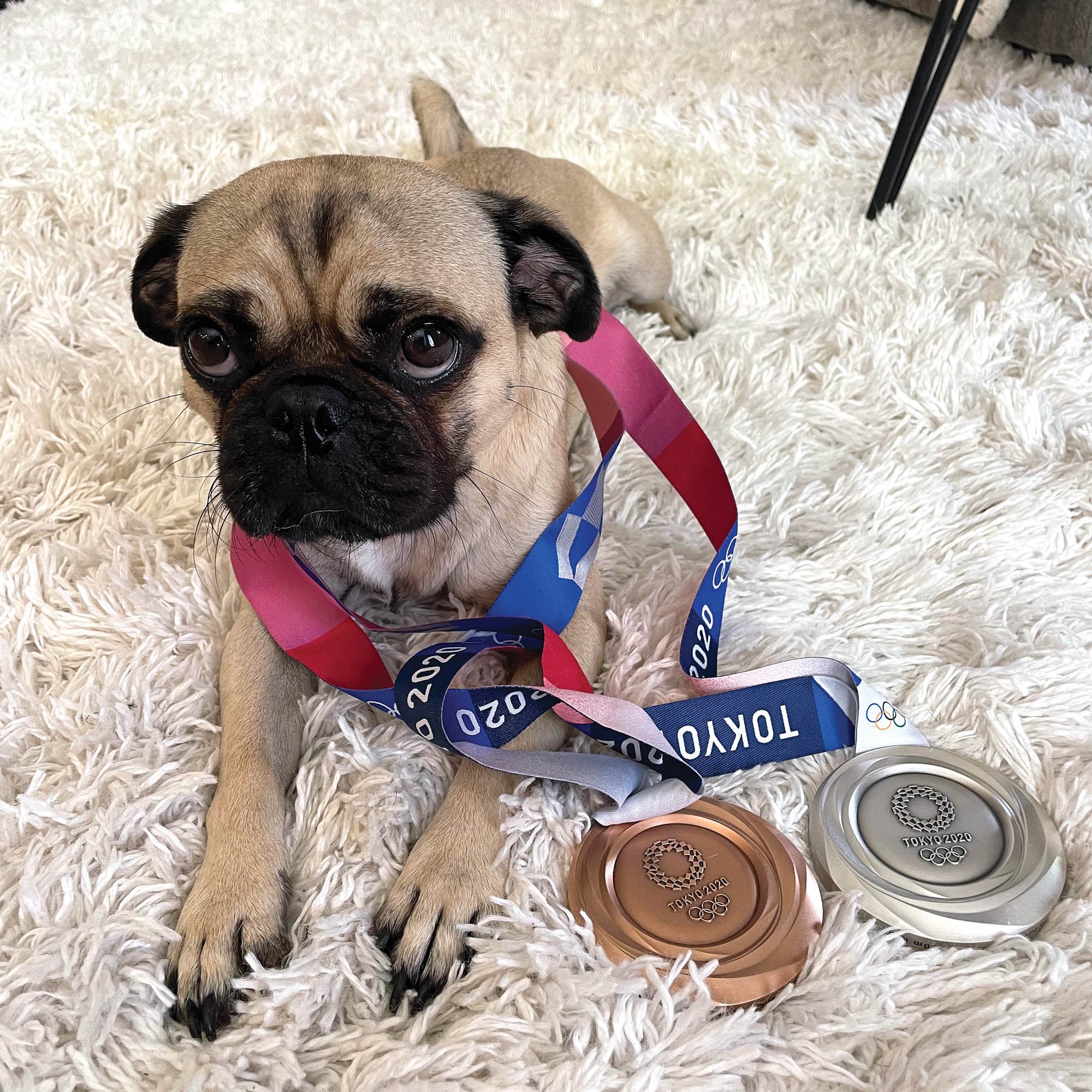
Can’t Live Without: Her air fryer. When Thomas became a pro athlete she had no idea how to cook herself healthy meals. After purchasing her air fryer, she uses it for everything. “Brussels sprouts, broccoli, salmon, chicken—those are my go-to things. You can make everything in your air fryer. It will change your life.”
Homecoming: When Thomas got back from Tokyo, neighborhood children had decorated her door with drawings of her as Wonder Woman. “It was adorable and so cute.”
200-Meter Grind: A lot happens in half a lap of the track. In the last 30 meters of the Olympic final, Thomas remembered what her coach told her: relax. “I brought myself out of that desperate state of grinding for a medal and just started to relax. Then I started to pull ahead.”
Waiting for Results: At the finish she wasn’t sure if she medaled. “I was thinking, ‘In a matter of seconds, something is going to pop up on that screen that’s going to change your entire life.’ That was nerve wracking.”
Celebs Sliding in Her DMs: After the Olympic Trials, she was shocked by the number of celebrities who noted her performance. Gabrielle Union posted a #WCW tribute while Ashton Kutcher sent a DM saying he and Mila were rooting for her. White House Press Secretary Jen Psaki openly cheered for her, too.
Looking the Part: Thomas loves that sprinters choose their look for the big races. Hair. Makeup. Nails. The whole thing is empowering, she says. But don’t all those long locks bother her? “You should be going fast enough that your hair is behind you, unless something has gone horribly wrong. Although in the final I wasn’t playing around. I put it in a ponytail.”
The Arm Sleeve: “I wear it as a reminder out of the blocks to drive my arm up.”
Worst Part of the Olympic Village: It wasn’t the cardboard bed, it was the mattress. “It was so hard. And the pillows were terrible. I couldn’t believe that we were sleeping on that.”
Best Part of the Olympic Village: “Simone Biles waved at me and I saw Yao Ming in the cafeteria quite a few times.”
The Upside of the Pandemic Games: The bonds forged among Team USA. “Everyone was just spending so much time together. It was really, really fun.”